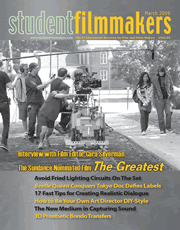Professional Motion Picture Production and Distribution NEWS
| Paula Brancato on Screenwriting and the Business: A Peak into The Writers Place By StudentFilmmakers.com posted Mar 16, 2009, 06:00 |
The Writers Place is featured in the March 2009 Edition of StudentFilmmakers Magazine, the # 1 Educational Resource for Film and Video Makers. Read the accompanying online article here.
 How does one go about selling his or her own screenplay?
How does one go about selling his or her own screenplay?
Paula Brancato: First, you write the best darned, kick-ass screenplay you can write. Do not send it out before you have shown it to at least 10 other people you trust � they need not be in the industry � and have incorporated their suggestions. Do not send it out until it can place in the finals of at least one reasonable screenplay contest. You can and should hire a script consultant to give it a read and provide you with professional script coverage. No one creates a great script in a vacuum.
Second, get your script noticed through screenplay contests and a PR plan. Develop an excellent pitch. Go to pitchmarts and festivals where you can pitch directly to industry professionals. Place the pitch in places where producers, agents and managers may see it and request the script itself. Do expect to spend money to support your script. One caveat, be sure to both copyright and WGA register your work before you send it out.
 Third, work on your pitch and query letter � hire someone to write one if you cannot. Test your pitch. When you are getting good responses, send a query letter with your pitch and the first ten pages of your script to any agent or manager you think may have interest. Of course, you will have done your homework and figured out who handles scripts like yours before you send the letters.
Third, work on your pitch and query letter � hire someone to write one if you cannot. Test your pitch. When you are getting good responses, send a query letter with your pitch and the first ten pages of your script to any agent or manager you think may have interest. Of course, you will have done your homework and figured out who handles scripts like yours before you send the letters.
Fourth, when you are sure you have a great pitch and a great script, go after everyone you know who might possibly know an agent, manager or producer who can help. And yes, do go directly to producers. You do not actually need an agent or a manager. If you garner a producer's interest, an agent or manager will take you on directly.
Finally, make sure a lawyer or reputable manager or agent reviews any document you will sign. An option on a script is no option at all, if the terms of the ultimate sale � yes, I do mean the sale price � are not spelled out in the option document. And you want to be sure you've asked for every type of compensation and credit that is possible.
How much do different kinds of scripts sell for?
Paula Brancato: Screenplays generally sell for 1% to 4% of negative cost. The single most important element influencing sales price is not the writer's ability but the cost of making the film itself. A $100 mm film will spend more on a script than a $1 mm film for obvious reasons. Whether a writer sells at the high or low end of the percentage range depends 1/3rd on the writer's skills, abilities and track record and 2/3rds on his or her representative's ability to drum up interest and negotiate an excellent deal.
Some writers are very good at the latter, but I do think you still want someone in there with you to conduct the negotiations. It's uncomfortable [to say the least] to argue with the people you will soon be working for. Negotiations tend to degenerate when the writer represents himself, e.g. Producer seeking a lower price: �I will not pay one cent more for your lousy script with all the holes in it!� Writer defending his material: �F^&$*&^(*k you!� Let someone else put the screws to the producer and get you an excellent deal.
What would you say are powerful ways to start a story?
Paula Brancato: Start at the point at which the main character has a problem. All else is back story.
When writers come to you for script consulting services, what are the writers' top needs?
Paula Brancato: Number one, a diagnostic. The writer needs to know whether his or her script is on target. Do the elements of story, structure, characterization, dialogue etc, work? What needs to be strengthened? What needs to be cut?
Number two, the writer needs help with a rewrite. Most scripts need substantial rewriting before they are ready for the market, whether written by a novice or a pro. Even a master writer like John Irving wrote 13 scripts from his book, �Cider House Rules,� before he felt he had one that �worked� as he wanted. Rewriting is the most important part of the process.
Number three, the writer needs to be able to describe his or her work succinctly so as to be able to pitch it to the industry. A good writer spends as much time on the pitch as the story. If the pitch doesn't work, there may be something that isn't working in the script either.
Number four, marketing and or self-production. We see many writers with strong material who need to find a way to get it to market or who would like advice on producing the film themselves. Some are writer/directors. Many are working in or pulling together a team with a director and/or producer who also needs to be able to ask a few questions.
When a writer comes to you for help, could you give us a picture of what the whole process entails?
Paula Brancato: We start with the material. Everything starts with the material � the script � which is the blueprint for the film. If the writer has a completed script, I will read it and provide coverage as per industry standards. Then, we will work with the writer on rewrites.
But many writers come to the Writers Place with story ideas, treatments, and or scripts in process. We will work with them 20 to 30 pages at a time, until the script is completed to a professional level. When the script is ready, we will also assist the writer with developing a pitch and deciding who to approach in the industry.
Writers and filmmakers seeking production and marketing advice may also purchase consulting hours to be used as they require. I have done everything from developing budgets to finding representation for writers, directors and producers.
Could you give us a brief outline of your script consulting services?
Paula Brancato: The Writers Place and I provide primarily script consulting, industry coverage, script analysis, and editing, as well as packaging and financing advice for filmmakers. We occasionally take on projects where we are involved in re-writing, script writing for credit and/or ghostwriting. We may also manage a promising new writer we have worked with extensively and been able to get an option deal or sale.
Over the past 5 years, we have raised over $50 mm for independent film and entertainment projects, collaborating with major studios, television networks, new media and production companies and taking hundreds of scripts through the development process. Writers Place' partners bring over 35 years' combined industry-wide experience to bear on elements of story, market positioning, packaging and financing as well as the detailed aspects of craft [structure, technique, etc.]. We can take a script from story idea into production, including packaging and finance.
What would you say sets your company apart from other script consultants?
Paula Brancato: The quality of our people and contacts. The Writers Place's founders belong to Harvardwood, HCNY, IFP, and various Wall Street associations. We teach at the University of Southern California, South Hampton Stonybrook, The Harvard Club and Southern Methodist University. We have extensive contacts throughout the industry and in finance.
The breadth of what we are able to do. We can take a script from story idea into production, including assistance with packaging and finance.
Integrity. People in the industry trust us.
Our success stories which you can see on the site or read about below.
The Writers Place founders and everyone who works here, down to the interns, are published and produced, award-winning writers.
What are the benefits and advantages for writers using your services?
Paula Brancato: Well, I think our success stories over the last 12 months speak for themselves. A fine young writer I manage, Matt Lutz, now has a deal with a Canadian producer for �Fat Camp,� his first film, which I was able to negotiate. The other writer I represent is directing her first soap episode for NBC. Three of The Writers Place winning screenwriters have had their work produced. One recently published a feature article in the �New York Times.� Our 2008/2009 Writers Place intern is now writing for �The Office.� We miss her and need a new one! Two of my 2008 USC MPW students are headed to Columbia and Stanford for PhDs.
Visit The Writers Place and Paula Brancato at www.thewritersplace.org/script_consultation.shtml and www.paulabrancatola.com.
Want a copy of this issue? Click here to get a copy of the March 2009 Edition of StudentFilmmakers Magazine.
Get best practices, insider techniques, and cutting-edge production stories on how to make motion pictures delivered right to your doorstep.
|